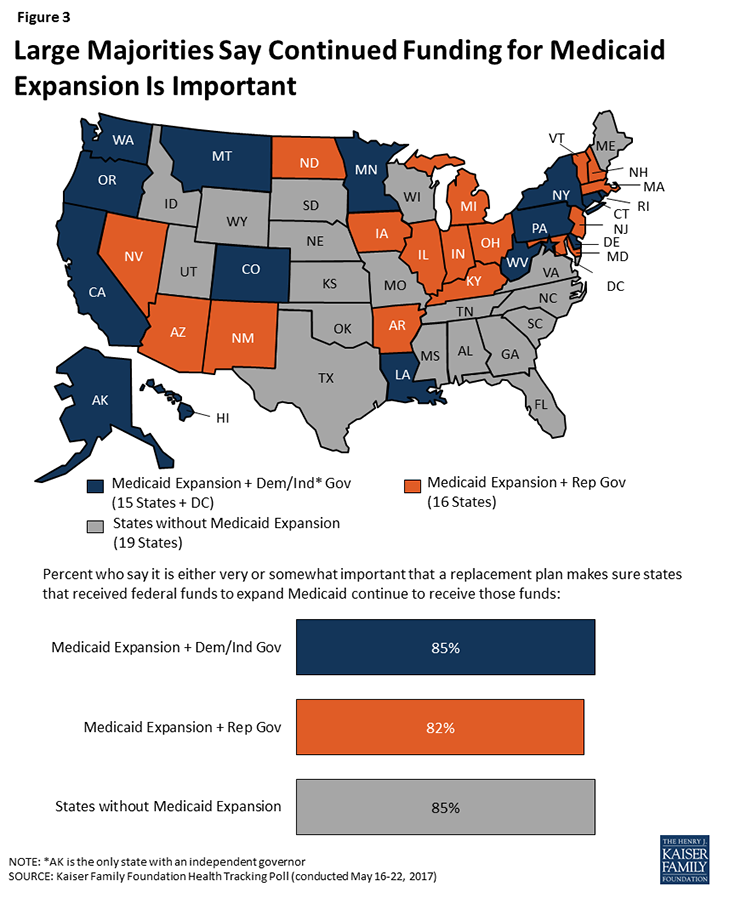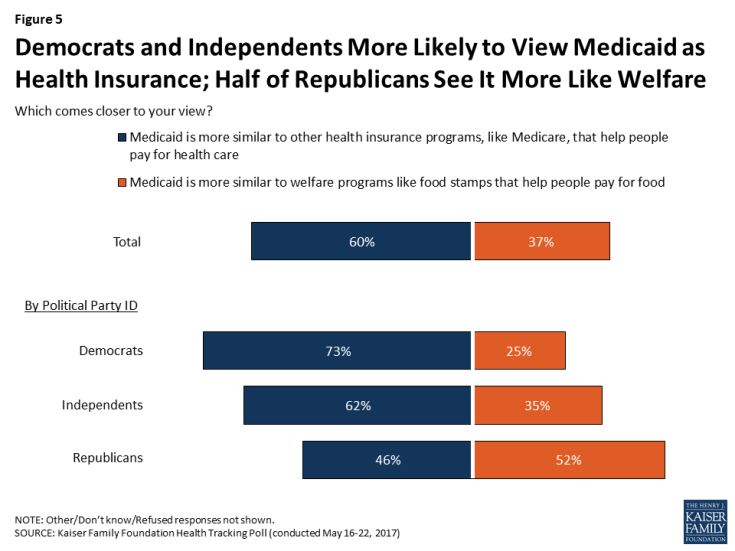Kaiser Health Tracking Poll - May 2017: The AHCA's Proposed Changes to Health Care
KEY FINDINGS:
- The American Health Care Act (AHCA) includes substantial changes to Medicaid – the program that provides coverage for medical care and long-term care services to low-income people. Overall, six in ten Americans (58 percent) say Medicaid is either “very” or “somewhat” important for them and their family – including a majority of Democrats (64 percent) and independents (57 percent) and nearly half (46 percent) of Republicans.
- The AHCA reduces federal funding for Medicaid expansion in states. The vast majority of the public – including a majority of Democrats (93 percent), independents (83 percent), and Republicans (71 percent) – say it is important that states that received federal funds to expand Medicaid continue to receive those funds.
- Currently, Medicaid is jointly financed by federal and state governments, with each state deciding how to structure benefits, eligibility, and care delivery within guidelines set by the federal government. Seven in ten (71 percent) Americans prefer keeping Medicaid largely as it is today while fewer (26 percent) support changing Medicaid to allow states more flexibility in determining which groups of people and what services are covered under the program.
Proposed Changes to Medicaid
This month’s Kaiser Health Tracking Poll examines attitudes towards the AHCA’s changes to Medicaid1 – the program that provides coverage for medical care and long-term care services to low-income people. Overall, six in ten Americans (58 percent) say Medicaid is either “very” or “somewhat” important for them and their family – including a majority of Democrats (64 percent) and independents (57 percent) and 46 percent of Republicans.
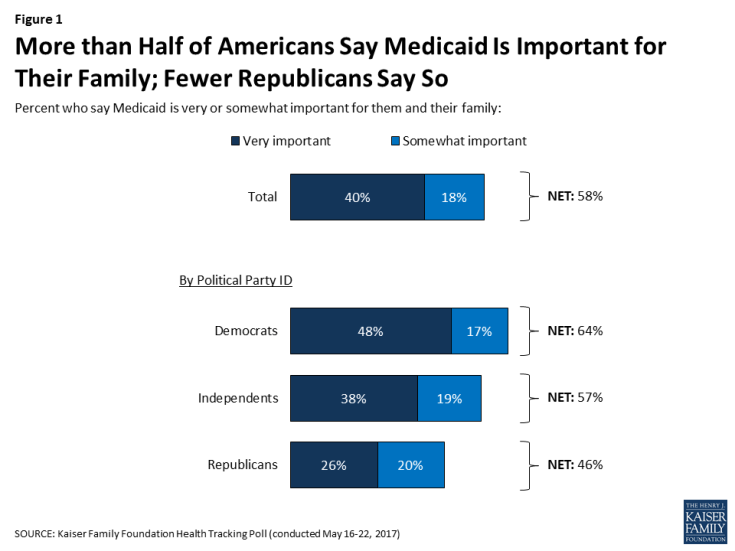
Figure 1: More than Half of Americans Say Medicaid Is Important for Their Family; Fewer Republicans Say So
Those who say Medicaid is either “very” or “somewhat” important for them and their family are more pessimistic about how their own health care will be affected if the president and Congress pass the health care plan currently being discussed. About half (53 percent) of those who say Medicaid is important for them and their family say their cost of health care will get worse compared to one-third of those who say Medicaid is not important for them. The shares who say their ability to get and keep health insurance and the overall quality of their own health care would get worse are also larger among those who say Medicaid is important compared to those who say it is not important for them (42 percent vs. 23 percent, 41 percent vs. 25 percent, respectively).
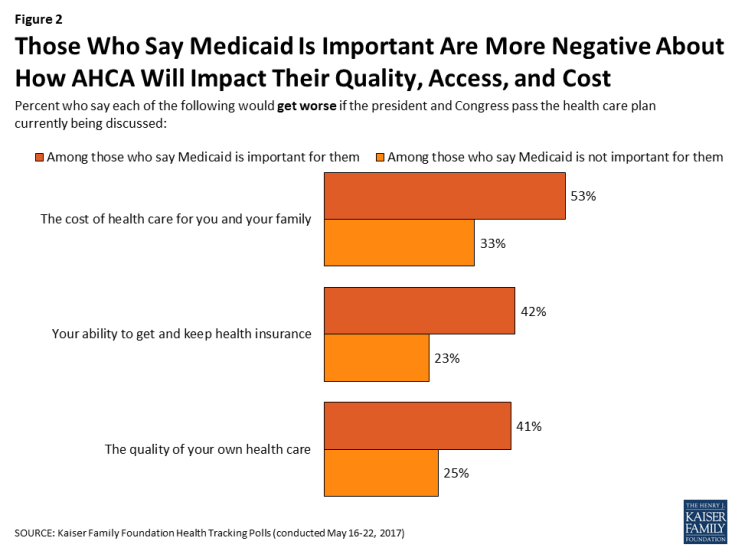
Figure 2: Those Who Say Medicaid Is Important Are More Negative About How AHCA Will Impact Their Quality, Access, and Cost
Public Supports Continued Funding for Medicaid Expansion
The 2010 Affordable Care Act expanded Medicaid coverage to over 11 million low-income, uninsured adults.2 The AHCA reduces federal funding for Medicaid expansion by 2020. The vast majority of the public – including a majority of Democrats, independents, and Republicans – say it is important that states that received federal funds to expand Medicaid continue to receive those funds.
| Table 1: Majorities of Democrats, Independents, and Republicans Say Continued Federal Funding for Medicaid Expansion Is Important | ||||
|
If lawmakers decide to repeal and replace the 2010 health care law, how important is it to you that a replacement plan makes sure states that received federal funds to expand Medicaid continue to receive those funds?
|
Total | Democrats | Independents | Republicans |
| Important (NET) | 84% | 93% | 83% | 71% |
| Very important | 58 | 78 | 56 | 35 |
| Somewhat important | 26 | 16 | 27 | 36 |
| Not important (NET) | 14 | 6 | 15 | 28 |
| Not too important | 7 | 3 | 7 | 15 |
| Not at all important | 7 | 3 | 8 | 13 |
| Don’t know/Refused | 1 | 1 | 2 | 1 |
Support for continued funding for Medicaid expansion is even popular among individuals living in states that have not expanded their Medicaid program.
Changes to Federal Funding for Medicaid
Currently, Medicaid is jointly financed by federal and state governments, with each state deciding how to structure benefits, eligibility, and care delivery within guidelines set by the federal government. The federal government matches state spending on an open-ended basis but the AHCA proposes changing this system so that instead of matching state Medicaid spending, the federal government would limit the amount it gives states to help pay for Medicaid coverage but could allow states more flexibility in determining which groups of people and what services are covered under the program.
When asked about a change to the financing structure, 71 percent say they think Medicaid should largely continue as it is today with the federal government guaranteeing coverage, setting standards and benefits, and matching state spending while fewer (26 percent) say Medicaid should be changed. Democrats and independents largely favor the status quo (90 percent and 70 percent, respectively) while Republicans are more divided, with a similar share supporting the status quo (47 percent) as do the proposal to change the funding structure (48 percent).
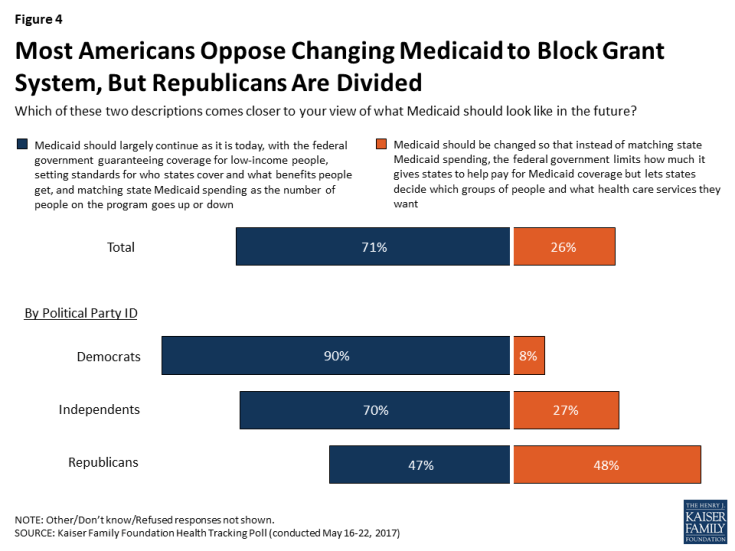
Figure 4: Most Americans Oppose Changing Medicaid to Block Grant System, But Republicans Are Divided
Partisanship Affects Basic Perceptions of Medicaid
Partisanship contributes to the public’s general perceptions of the Medicaid program. When asked whether Medicaid is more similar to other health insurance programs or to welfare programs, more Americans view Medicaid like other health insurance programs (60 percent) that help people pay for health care than view it as a welfare program (37 percent). Yet, these perceptions are largely driven by partisanship with Democrats and independents more likely to view Medicaid as a health insurance program and Republicans more likely to view it as a welfare program.

